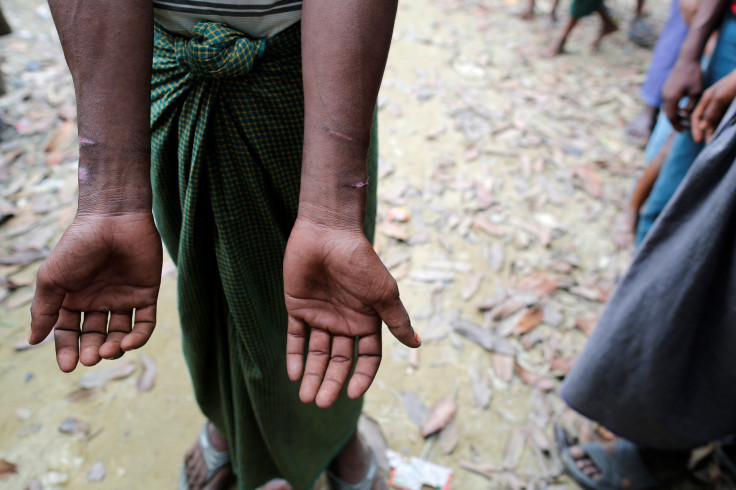Myanmar Soldiers Raped Rohingya Muslims, Killed Village Residents And Burned Homes, Ethnic Women Say

At least eight women in Myanmar belonging to the long-persecuted Muslim minority Rohingya say Burmese soldiers raped or sexually abused them. The claims have come amid a bloody crackdown by the Myanmar military on rural villages alleged to be harboring Rohingya militants who have killed dozens and left thousands of people displaced and living on rice fields this week.
After arriving in the in Kyee Kan Pyin village — a Rohingya stronghold in the central region of Mandalay — and ordering 2,000 villagers to evacuate, eight women told Reuters soldiers had raided their homes, looted property, and raped them at gunpoint Sunday.
“They took me inside the house. They tore my clothes off and took my head scarf off,” a women from the village, U Shey Kya, said in an interview outside of her home. “Two men held me, one holding each arm, and another one held me by my hair from the back and they raped me.”
Though Myanmar’s government, which is headed by Nobel Prize winner Aung San Suu Kyi, said the military campaign was in response to recent attacks on border security forces, residents said soldiers were killing non-combatants and burning homes.
The military said it was acting upon evidence acquired from interrogations with suspected militants that an Oct. 9 attack which killed 9 police officers was committed by a group of 400 Rohingya fighters in the Mandalay region.
Colonel Sein Lwin, the police chief for Rakhine State where the raids took place, told Reuters the rape claims were “propaganda for Muslim groups.” Other Burmese authorities, including the president’s spokesman Zaw Htay, told Reuters other militant groups such as the Islamic State group and al Qaeda used similar tactics in order to inspire militants to commit jihad-motivated terror attacks.
This week’s village crackdowns were the latest stain on the bloody history between the Myanmar government and the estimated 1 million Rohingya people, representing the biggest upsurge in violence against the greatly persecuted ethnic minority group in four years. Diplomats and United Nations officials told Reuters privately that the Oct. 9 attacks and subsequent crackdowns largely negated years of work Suu Kyi’s government had put forth trying to rebuild the trust between the Muslim and Buddhist communities since religious and ethnic violence broke out there in 2012.
About 100,000 Rohingya people were still housed in displacement camps due to the 2012 communal violence that resulted in more than 100 people dead and 140,000 others displaced, Time reported.
Suu Kyi has been praised for her humanitarian efforts following her landslide election win last year, which directly resulted in President Barack Obama committing to lifting the United States economic sanctions on the small Southeast Asian nation last week. But activists have called on her newly formed democratic government to do more for the Muslim minority group that the United Nations referred to as “the most persecuted refugees in the world.”
The United Nations High Commissioner for Human Rights, Zeid Ra’ad Al Hussein, has urged the government to end the “systemic discrimination” and ongoing human rights violations against the Rohingya people, according to a 2016 UN report on the treatment of minorities in Myanmar. The report cited human rights violations from the Myanmar government, the most impactful being that the Rohingya people are denied the rights associated with having Burmese citizenship. Those rights include marriage, healthcare, education, and, subsequently, having a nationality. The report also documented severe restrictions on freedom of movement, forced labor and sexual violence.
© Copyright IBTimes 2024. All rights reserved.






















